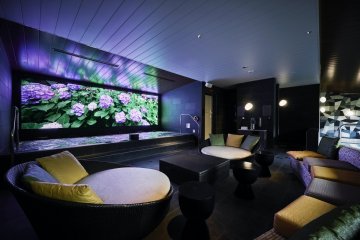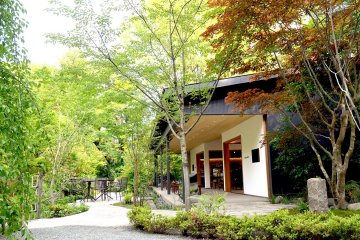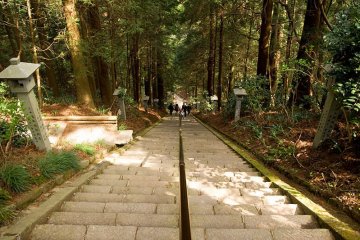
Hydrangea Retreat at the Hotel Indigo Hakone Gora 2021
Kim BergströmDuring hydrangea season for 2021, the Hotel Indigo Hakone Gora is offering a hydrangea-themed retreat for guests.

At Pan no Mimi, you can try some truly delicious and unique bread-based food. Along with their assortment of hot sandwiches like tuna-cheese or ham and cheddar, don't look over the bread gratin—seafood gratin and cheese baked into half a loaf of fresh bread.

During hydrangea season for 2021, the Hotel Indigo Hakone Gora is offering a hydrangea-themed retreat for guests.

Nestled in the lush gardens of Miyanoshita, Fujiya Hotel will intrigue every sense of your well being from the moment you lay your eyes on the hip-and-gable roof tops.

If ‘nostalgic’, ‘classic’, and ‘classy’ are high on your list, then the Fujiya Hotel in Hakone is going to please you immensely.

Box Burger serves some of the best Ashigara-beef hamburgers in the prefecture. When you order one of their juicy, thick burgers, don't forget to grab one of the handmade shakes to go with it. Try Vancouver Coffee here, a local Atsugi brand and made from Kyoto arabica beans, which will also be sure to keep you going for the rest of your trip!

Discover a cafe where you can feel the spirit of Ninomiya Sontoku, the deity of Hotoku Ninomiya Shrine. Sip on Italian coffee while you try an Edo-period meal called gojiru (miso soup with mashed soybeans) while surrounded by the beauty of nature.

Cute Hakone restaurant Pan-no-Mimi has hearty delicious food like seafood gratin served in a bread case.

Be awed by storm clouds of volcanic steam that gather over the active volcano, Owakudani (大涌谷), the Great Boiling Valley. Created around 3,000 years ago, today the crater-valley is a popular tourist site, despite the ominous and evocative name. The volcanic valley is still alive today with active sulfur vents and hot springs. Once called the “Grand Inferno” or “Great Hell” thanks to the streams of white sulfuric smoke reaching toward the sky, it was renamed when the Meiji Emperor and Empress visited Hakone in 1873 because locals hesitated to invite the two to a place with such a foreboding name. Marvel from the Hakone Ropeway, 130 m above the valley bottom. Sulfur and water vapor pour out at about 100°C. The terrible landscape creates an image of hell that had even famed Japanese Buddhist monk, Kūkai, offer a prayer to Bodhisattva at the sight. At sunset, the sunlight from Lake Ashi glitters off the waters to offer a beautiful sight one might not expect next to the nightmarish landscape. While here, be sure to try the legendary kuro-tamago—hot spring hard-boiled eggs with shells turned black by the iron sulfide in the volcanic waters—these treats are only available at Owakudani. Eating one is said to add seven years to your life. At the top of the observation deck overlooking Owakudani you might even spot the majestic Mount Fuji on a fine day, this being one of the best spots to see it from. Access Owakudani by the Hakone Ropeway from Owakudani Station, or by bus. Although it is advised that people with asthma, bronchitis, heart disease, pacemakers, and pregnant women not enter the valley due to high volcanic activity. The volcanic gas concentration and temperature are constantly measured at the Hakone Ropeway stations to ensure the safety of guests and the site may be temporarily closed due to high levels of gas or volcanic activity. Volcanic alerts were lifted on Friday Nov 15th 2019, ending a six-month closure that saw most parts of the Owakudani area temporarily closed to access due to an increase in volcanic gases. The area is now safe to access, though it is advised that those with respiratory problems, heart conditions, pregnant women or young children do not enter the valley due to slight risk from volcanic fumes.

Daiyuzan Saijoji is a temple with a deep connection to the tengu, those creatures who occupy a special place in Japanese folk religion. For example, folklore has it that the tengu, in a variety of different ways, supported the Zen priest who first built Saijoji TempleThe Daiyuzan Saijoji Temple in Minamiashigara is a breathtaking temple of Soto Zen Buddhism. The temple grounds, which were built more than 620 years ago, contain around 30 ceremonial halls and other temple buildings. The temple is surrounded by an impressive cedar forest. In the temple the novices receive their formal religious training to become monks. There are 3 impressive halls on the temple grounds that are worth visiting: the Hondo, Kaisando and Myogaku halls. The temple has a deep connection to the mythical creatures of the Tengu, those creatures that have a special place in Japanese folk religion. For example, it is said in folklore that the Tengu supported the Zen priest who built the Daiyuzan Saijoji Temple in various ways.

The Hakone Shrine is a Japanese Shinto shrine on the shores of Lake Ashi in the town of Hakone in the Ashigarashimo District of Kanagawa Prefecture. It is also known as the Hakone Gongen. [Wikipedia]